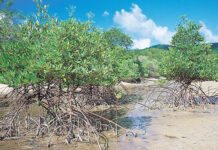
Staff Reporeter, Agricare24.com: An innovative landslide early warning system will be deployed in Bangladesh for the first time. An important step in disaster risk management for the country said The Food and Agriculture Organization of the United Nations (FAO).
Today Wednesday (13 January 2021) FAO Representative in Bangladesh, Robert. D. Simpson, said: “FAO is working with the government to enhance community resilience to disasters and this new landslide early warning system, which is a significant improvement based on modern technology, will help to save lives.”
Landslides cause loss of life, injury, and damage to property and infrastructure. Climate change, high population density, deforestation, and unplanned land use contribute to the frequency and severity of landslides and the amount damage that they cause. In Bangladesh, landslides typically strike in hilly areas between May and September when rainfall is heaviest. It is estimated that there are around twenty a year.
The Food and Agriculture Organization of the United Nations (FAO), in partnership with government partners, has developed a new early warning system for Cox’s Bazar that is based on risk modelling using inputs from satellite imagery, rainfall levels, and other meteorological data. An estimated one million people live in areas at high risk of landslides in Cox’s Bazar, including Rohingya refugees and host communities.
Currently, landslide warnings can only be made a couple of hours before an event allowing a very limited time to respond but the new system will make it possible for people who live in danger areas to be notified up to five days in advance by email and mobile phone SMS messages.
The early warning system was developed by FAO in collaboration with the Cox’s Bazar District Administration and the International Union for Conservation of Nature (IUCN), with financial support from USAID’s Bureau for Humanitarian Assistance.
High resolution satellite imageries were analysed to identify 890 of the most vulnerable sites in the region. Teams then collected field data from these sites and worked with local government officials and community leaders to develop the system.
FAO will work with the Ministry of Disaster Management and Relief (MoDMR), and the Ministry of Environment, Forest and Climate Change (MoEFCC) to scale up the early warning system across the country.
FAO’s Dr. Bayes Ahmed, an internationally recognised landslide expert, worked on the project. “This system gives landslide warnings based on predicted rainfall data, analysing landslide-prone areas and rainfall thresholds, and detailed landslide inventory. Residents and officials then receive alerts via email or phone”, he explained.
FAO and partners this week held a stakeholder workshop to discuss existing landslide preparedness, response plans, challenges, and organizational responsibilities. Marco DeGaetano, Head of FAO’s Sub Office in Cox’s Bazar, Raquibul Amin, Country Representative of IUCN Bangladesh, and Md. Solaiman Haider, Director of Planning at the Department of Environment, Ministry of Environment, Forest and Climate Change, attended the event along with Army officials, local government leaders, and community volunteers. The findings of the workshop will be used to prepare a three-tier short, medium, and long-term action plan ahead of the new warning system coming into operation within a few months.
The Food and Agriculture Organization (FAO) is a specialized agency of the United Nations that leads international efforts to defeat hunger. Our goal is to achieve food security for all and make sure that people have regular access to enough high-quality food to lead active, healthy lives. With over 194 member states, FAO works in over 130 countries worldwide. We believe that everyone can play a part in ending hunger.
IUCN is a membership Union composed of both government and civil society organisations. It harnesses the experience, resources and reach of its more than 1 400 Member organisations and the input of more than 17 000 experts. This diversity and vast expertise make IUCN the global authority on the status of the natural world and the measures needed to safeguard it.
New landslide early warning system to be used in Bangladesh for the first time This information was given to Agricare24.com MH Kawsar Rudro.
Agricare/MH
























